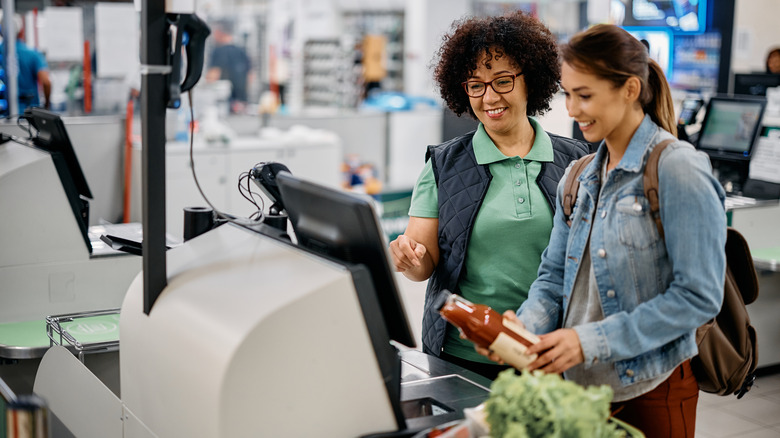Are Supermarkets Reassessing Self-Checkout Systems?
3 min read
Young happy woman using self-service checkout with help of supermarket worker.

Young happy woman using self-service checkout with help of supermarket worker.
Supermarkets in the UK, after years of promoting self-scan technology, are now revisiting traditional checkout methods. Retail giants like Asda and Morrisons are shifting their focus, with Asda promising more staffed checkouts and Morrisons acknowledging it may have overextended with self-service options. In a notable move, Booths, an upscale grocery chain, eliminated self-checkouts altogether last November.
Customer feedback highlights a variety of issues with self-service tills. Common complaints include the irritating “unexpected item in the bagging area” alerts and the intrusive cameras that monitor shoppers during the checkout process. For some, these issues detract from the convenience that self-checkouts are supposed to provide.
However, many shoppers still appreciate the efficiency and independence that self-service offers. For example, some people prefer the speed of self-checkouts to avoid long queues and avoid conversations with cashiers.
Morrisons’ CEO, Rami Baitiéh, acknowledged that the chain might have pushed self-checkout technology too far. “While self-checkouts can enhance productivity, they aren’t ideal for everyone, especially those with full trolleys,” he told the Telegraph. Consequently, Morrisons is reassessing its self-checkout strategy and plans to reinstate more staffed tills.
Asda has also recognized the limits of self-service. The retailer has committed to increasing the number of staffed checkouts to better balance customer needs. This move follows an admission that they had reached a saturation point with self-service technology.
Booths, a smaller yet high-end supermarket chain, made a decisive shift by removing self-checkout machines entirely. This move reflects a broader trend among retailers to reevaluate the benefits and drawbacks of self-service options.
Customer experiences with self-checkouts vary widely. Beverley Hyrb from Oldham finds the live footage cameras unsettling and prefers the human interaction found at traditional checkouts. She highlights the mental health benefits of engaging with checkout staff, especially for individuals who live alone.
For others, like Anna Kenyon from Manchester, self-checkouts pose practical challenges. Kenyon, who is deaf, struggles with the beeping sound associated with scanning items and finds human cashiers more accommodating. She values the spontaneous connections she has had with staff, such as being greeted in sign language at Aldi.
Julie Yates, whose sons have autism, finds self-checkouts beneficial for her family. They provide her sons with independence and avoid the social pressures of interacting with others. Conversely, Yates herself prefers the interaction that a staffed checkout offers, viewing it as a positive part of her shopping experience.
For some, like 74-year-old Trevor Springford from Dunbar, self-checkouts are a preferred option due to their speed and efficiency. He appreciates the quick checkout process and minimal social interaction.
The British Retail Consortium, representing major supermarkets, has not indicated a broad shift away from self-scan systems. A spokesperson mentioned that retailers will continue to adjust their checkout systems to accommodate varying customer preferences.
Ged Futter, director of The Retail Mind consultancy, emphasized that customer feedback is crucial in shaping retail strategies. While self-scans can reduce labor costs, if they negatively impact the customer experience, they can ultimately harm business. “Retailers must balance cost considerations with customer satisfaction,” Futter said.
Supermarket chains like Tesco, Lidl, Co-Op, and Waitrose have confirmed they will maintain a mix of self-service and staffed checkouts. Marks & Spencer stated that their stores offer various formats to cater to different customer needs, always keeping at least one staffed checkout available.

Tesco, which introduced self-checkout tills nearly two decades ago, highlighted their commitment to providing customer choice. A Tesco spokesperson noted that customers can always request a staffed till if needed.
Fazilet Hadi from Disability Rights UK argued that customers should not have to request a staffed checkout, as staff visibility can be an issue. However, she acknowledged that accommodations must be proportionate to the scale of the store.
Mel Merritt from the National Autistic Society noted that while self-service checkouts offer reduced social interaction for some, others may benefit more from the support provided by staff.
In summary, while self-checkouts have become ubiquitous, supermarkets are increasingly recognizing the need to balance technology with personal service to meet diverse customer needs.